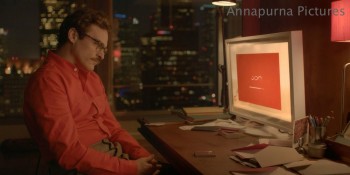Valentine’s Day has relationships on everyone’s mind, and it leaves some asking themselves, “Just what is love?” The film Her attempts to answer that fundamental question from a unique perspective by asking a question of its own: Can a man and a machine be in love?
Her, written and directed by Spike Jonze in his first feature film since 2009, tells a complex and unusual love story that’s surprisingly poignant and relevant. Jonze has created a world where computer operating systems are self-aware artificial intelligences. In this setting, a reclusive man named Theodore develops a relationship with the “woman” in his computer, Samantha.
Joaquin Phoenix brings sincerity and heart to a character that could easily have been seen as pathetic or creepy. Instead, the audience can’t help but feel for the lonely, anti-social Theodore Twombly. As his relationship with Samantha, voiced by Scarlett Johansson, progresses, it’s evident he has genuine feelings for her, despite the fact she isn’t human.
Early in the film, it becomes clear Theodore spends much of his time alone. However, as his relationship with Samantha grows, so does his confidence. He begins interacting with the world again, spending more time with friends and even going on a double date with his coworker.
Theodore’s evolution over the course of the film makes a case for the authenticity of his love. If one of the signs of a healthy relationship is that it helps one grow and become a better person, then Theodore’s relationship with Samantha, however bizarre it may seem, is more productive than the toxic ones many humans endure. For Theodore and Samantha, this relationship is completely real.
Her is the only film nominated for Best Picture at the Academy Awards that takes place in an imagined future, incorporating some elements of science fiction and fantasy. As many of the best science fiction stories do, Her shines a light on certain aspects of our current society. By changing elements of the reality we are familiar with, Her frees us from so many of the constraints we have when evaluating the nature of love.
Many people today turn to the Internet to find friends and significant others. Granted, there is another person, made of flesh and blood, sitting at the computer on the other side of those relationships. But by altering the present just slightly, Jonze introduces a near future that isn’t so far-fetched and that has relevance to relationships of any era.
In fact, the film draws attention to the lack of authenticity that plagues many traditional human relationships. Theodore works for a company that produces handwritten letters for clients who want to send a “genuine” message to relatives, lovers, or anyone else. Theodore mentions one couple he has worked with for eight years; he likely knows them better than they know each other — or even better than they know themselves. This scenario calls to mind the current state of our society, where people often spend more time texting and staring at their smartphones than having face-to-face conversations with those right in front of them.
The sci-fi elements of the movie blend seamlessly into the film in a subtle and understated way. In this world, computers are completely integrated with cell phones and obey voice commands spoken into a Bluetooth-like device. There’s just enough advancement in technology to tell that this film takes place at some point in the future, but the audience is not being hit over the head with shiny distractions. This environment creates a rich backdrop for an intriguing film.
Amy Adams is delightful as Theodore’s neighbor and friend. She adds a much needed lightness and humor to the film. Plus, her rapport with Theodore demonstrates one of the few positive human relationships he maintains. Their interactions provide some added insight into Theodore’s character; he’s not incapable of maintaining a human connection, he just needs someone who understands him.
Her is sweet and sincere, but sometimes feels a little too saccharine. Its soft focus and pastel color palette create a jarring contrast during the heavier moments of the film. Compared to much larger-scale films like The Wolf of Wall Street or Captain Phillips, one wonders how it made it into the Best Picture category. This is a much more subtle and nuanced film than any of the others in the category with the possible exception of Nebraska.
This isn’t the type of film that appeals to a wide audience. The viewer has to be willing to think about the story beyond what’s on the surface; otherwise, it may just seem depressing or awkward. Unlike the aforementioned films, Her didn’t provoke an immediate reaction as I walked out of the theater, but I soon found it had gotten in my head and stayed with me for days after viewing.
Fans of Jonze’s previous works will likely know what to expect and will enjoy the film more than those who are just looking for a simple love story. But if you let yourself reflect on the film, you just might find yourself reevaluating your real-life and online interactions, and perhaps the definition of love itself.
